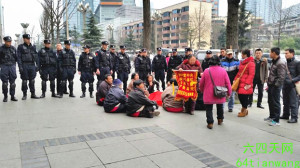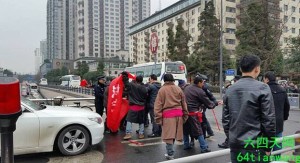A group of around 10 Tibetan nomads held a vigil outside the hotel in Chengdu, capital of Sichuan Province, where an official meeting was being held on January 28. They were calling for protection to pasture areas and opposing illegal land acquisition.
The Tibetans, wearing Tibetan traditional dress, were detained and taken away by armed police about ten minutes after they sat outside the hotel where a session of the Regional People’s Congress was being held. Their current whereabouts is unknown.
The nomads carried banners that read “Defend pasture lands of herdsmen. Firmly oppose illegal land acquisition”, “Homes are being occupied. We have no home to go.” According to exile Tibetan sources in contact with Tibetans in the area, the nomads said that they were “risking their lives to protect their grasslands and livestock”. The nomads feel that they and their animals had been displaced from their land due to government policies of confiscating pastureland and slaughter of livestock.
The group of Tibetans is from a nomadic area of Ngaba (Chinese: Aba) Tibetan and Qiang Autonomous Prefecture, Sichuan province, according to the same Tibetan sources, where policies of settling nomads are well advanced. Chinese government policy to implement policies of settling Tibetan nomads, confiscating their land, and fencing pastoral areas, is leading to dramatically curtailing nomadic herders’ livelihoods, and increasing poverty, environmental degradation and social breakdown across Tibet.
Tens of thousands of Tibetan nomads have been required to slaughter their livestock and move into newly built housing colonies in or near towns, abandoning their traditional way of life. These policies give the authorities greater administrative control over people’s movements and lifestyles.
There is increasing concern about the impact of these policies on Tibet’s fragile high-altitude landscape by Chinese and Western experts as well as the Tibetan nomads themselves. Not only are the policies threatening one of the world’s last systems of sustainable pastoralism, but scientific evidence shows that these policies are threatening the survival of the rangelands and Tibet’s biodiversity. Chinese, Tibetan and Western scholars have pointed out that settling nomads runs counter to the latest scientific evidence on lessening the impact of grasslands degradation, which points to the need for livestock mobility in ensuring the health of the rangelands and mitigating negative warming impacts.[1]
Following a mission to China in 2010, the then UN Special Rapporteur on the Right to Food, Olivier De Schutter, said that Tibetan and Mongolian nomads should not be compelled to settle.[2] The Special Rapporteur linked nomad settlement to deprivation of livelihood, stating: “While there is little doubt about the extent of the land degradation problem, the Special Rapporteur would note that herders should not, as a result of the measures adopted under the tuimu huancao (‘removing animals to grow grass’) policy, be put in a situation where they have no other options than to sell their herd and resettle.”[3]
Footnotes
[1] China Dialogue, ‘An uncertain future on the Plateau’ by Katherine Morton, April 28, 2009, https://www.chinadialogue.net/article/show/single/en/2961
[2] The mission was on December 15 – 23, 2010. Also see ICT report, December 23, 201, https://savetibet.org/un-special-rapporteur-warns-of-consequences-to-nomad-settlement/
[3] Preliminary observations and conclusions: Mission to the People’s Republic of China, December 15-23, 2010, December 23, 2010), http://www.srfood.org/images/stories/pdf/officialreports/de-schutter-china-statement.pdf



